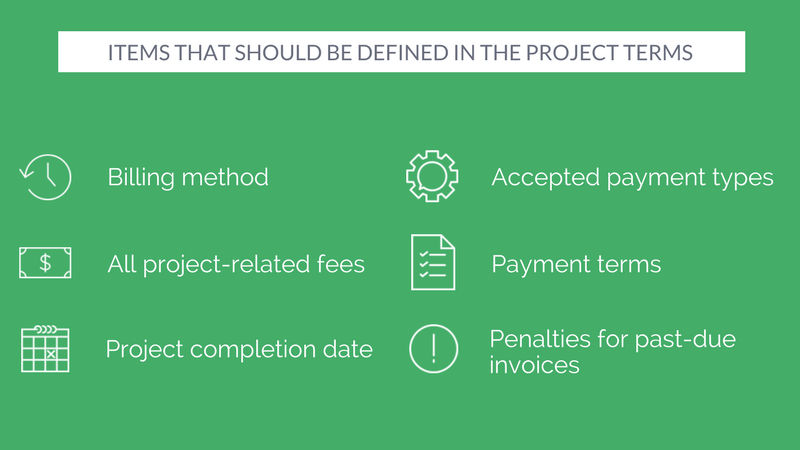*This is the 3rd article in a series of articles related to project billing and project-based accounting.
Read the 1st article: Developing an Effective Project Billing Process
Read the 2nd article: Should You Use Milestone Billing or Project-Based Billing?
“Policy…A plan or course of action, as of a government, political party, or business, intended to influence and determine decisions, actions, and other matters.” (The Free Dictionary)
Regardless of size, all organizations spend a lot of time thinking about policy. They devise policy, communicate policy, and try to enforce the policies they’ve established. Why? Because of the power policy has to “influence and determine decisions, actions, and other matters” is critical to success.
An organization’s policies can make or break the organization. Poorly conceived, poorly communicated policies create an operational nightmare from which an organization may never recover. Well-thought-out, easily understood policies, on the other hand, help an organization build on its momentum to operate more effectively than would otherwise be possible.
Policy touches every aspect of organizational life and can be formal or informal. For the professional services organization (PSO), though, one area where “casual” policy just won’t do and well-planned, consistently followed policy is critical is project billing. Here, the policies observed can make the billing process an uneventful part of the service cycle, or they can turn this function into a battleground that leaves clients wondering if they hired the right PSO.
Project billing will never be a pleasant experience for clients. But by instituting sound billing policies, your PSO can increase the respect and trust your clients have for you while at the same time realizing the financial goals you’ve set for every project:
Get paid. Get paid the full amount owed. Get paid promptly.
If you’re not sure where to begin in setting your organization’s project billing policies, following are a few suggestions to help you get started.
Billing Software
Even in this cloud-based age, it’s amazing how many PSOs still use spreadsheets or manual systems to track and bill client projects. Mistakes and inconsistencies are a given with such an approach. When they occur, at best, they only slow down a PSO’s cash flow (pending resolution of billing issues). At worst, however, they can erode client confidence in the PSO – sometimes to the point where invoices go unpaid and the PSO-client relationship terminates.
Perhaps the most fundamental billing policy a PSO can establish, then, is twofold: (a) deciding to implement billing software and (b) choosing which software to use. A quick online search shows there’s no shortage of contenders. In fact, there are so many choices that the selection process can be downright confusing.
This decision shouldn’t be based on price, but on compatibility of the software with the services of the PSO. For example, PSOs that bill by the hour will want software with time billing features. PSOs offering subscription-type services will value recurring billing capabilities.
Personnel Training
Regardless of the software, project billing efficiency will still suffer if the billing staff isn’t trained in billing operations. As Simon Speirs of Southerland Global Services points out, “Billing is frequently an entry-level position, and without proper training, error rates increase….The best way to support efficient billing is to ensure that all team members have access to written policy guidelines and are trained in the correct procedures.”
But instruction in billing operations is only half of an effective staff training policy. The other half is teaching personnel about the value of customer service. This is only logical. It’s one thing to improve project billing efficiency; it’s another to improve efficiency and make clients mad in the process. Even though billing is a client’s least-favorite part of any project, it shouldn’t be allowed to degrade the PSO-client relationship into an adversarial one.
Training staffers in how to diplomatically respond to client billing issues can help avoid this situation. “Your employees need to get the right balance between stating policy and providing the right level of customer service and satisfaction,” adds Speirs.
Project Billing Data
Project billing can’t happen without data. What information do you need to prepare invoices? Contact details? PO numbers? Compliance records? Whatever is essential, make it policy to (a) gather this information at the start of each project and (b) store it in a central location for easy reference and retrieval.
“Every piece of billing-related data should be at the fingertips of the people who need it,” notes Merily Leis. In her view, here’s where the right billing software can make a difference, providing digital connections and quick access to billing data, while eliminating the need for personnel to conduct manual searches.

Project billing also can’t happen without data accuracy. “Capturing information completely and accurately is the most important step in the process", states financial solutions expert Jeff Sobers. “Incorrect address or biographical information renders the rest of the process moot.” Along with what billing data to collect and where to store these, good project billing data policy should include a system for ensuring the information collected is complete and accurate.
Project Terms
Net 10, COD, 1% 10 Net 30 – everybody understands payment terms. These are a subset of a larger set of project terms that govern the PSO-client relationship during project completion. One of the cardinal mistakes a PSO can make is not getting client agreement on the project terms before a project begins.
“Before you start working with a client, you should both agree on a set of terms,” says Merily Leis. “It’s the basis for good customer relations, it helps you avoid surprises, and increases your chances of getting paid on time.” Leis suggests project terms should define –
- Billing method (by the hour, by project, etc.).
- All project-related fees.
- Project completion date.
- Acceptable payment types.
- Payment terms.
- Penalties for past-due invoices.
This is the minimum list. For any project, think about the areas that could become issues at some point. How will out-of-scope project tasks be handled? What will occur if the project is canceled before completion? Who’s responsible for taxes? Whatever you come up with, chances are it should be addressed in the project terms.
 Few feelings are worse than having a client look at an invoice and say, “Hey! I don’t remember agreeing to this.” To avoid such sticky situations, make upfront agreement on the project terms a fundamental of your project billing policies.
Few feelings are worse than having a client look at an invoice and say, “Hey! I don’t remember agreeing to this.” To avoid such sticky situations, make upfront agreement on the project terms a fundamental of your project billing policies.
“That’s Not Our Policy”
When you think about it, not having a policy is a policy. As stated earlier, policies can be both formal and informal. Typically, this means written and unwritten. And while informal policies work just fine in some areas of an operation (e.g., how you show appreciation to suppliers during the holidays), they are never a good idea for a function as critical as project billing.
For a billing process that is yet another example of the quality services your PSO offers, set and follow good policy.
Looking Ahead…
Part 4 of this series will discuss how to improve the effectiveness of project invoicing.
For additional information on Beyond Software please contact:
Nicole Holliday
nholliday@beyondsoftware.com
866-510-7839



